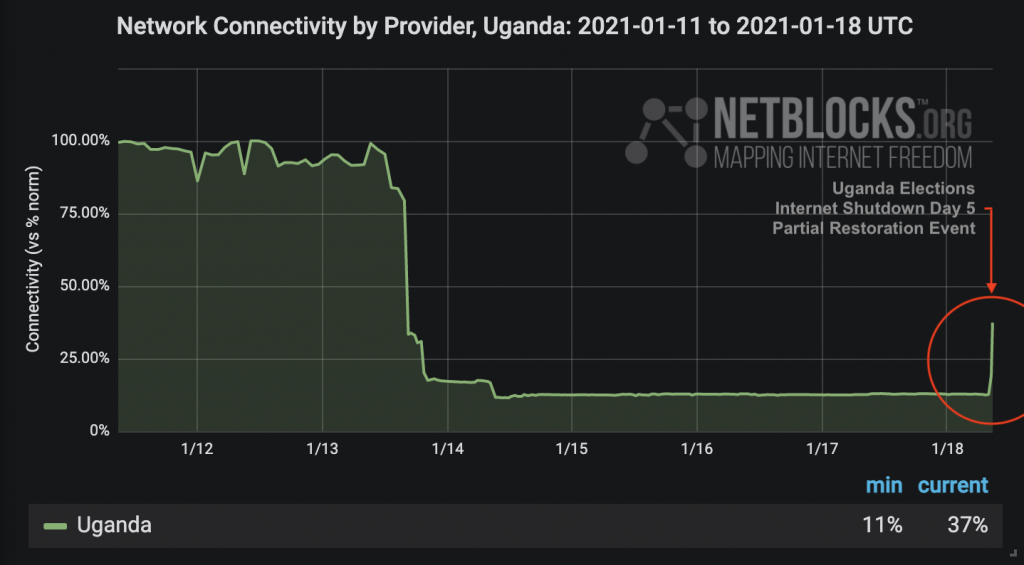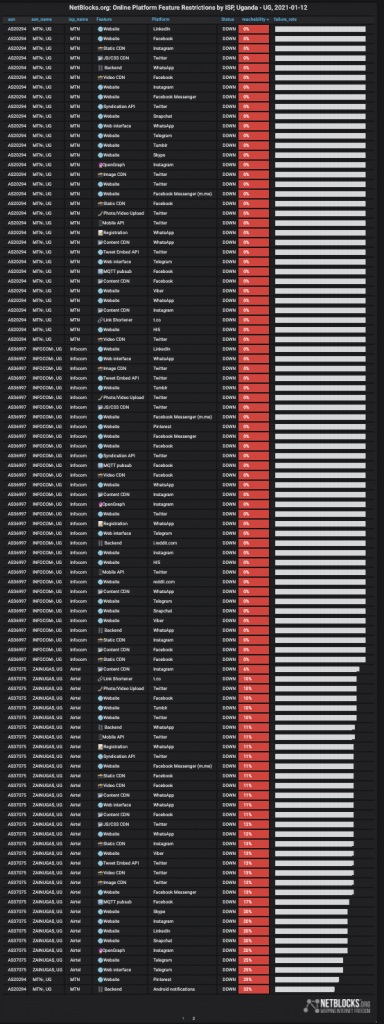Network data from the NetBlocks Internet Observatory confirm Uganda is in the midst of an internet blackout continuing from 13 January 2021 up until the 18th, following prior social media and messaging restrictions recorded Tuesday 12 January 2021. Findings below reveal the extent of restrictions issued by order of the Uganda Communications Commission before, during, and after presidential and parliamentary elections held on the 14th.
Update: Basic network connectivity has returned as of the 18th, reaching 90% of ordinary levels by the evening. However, an extensive list of social media and messaging restrictions remain in place, similar to that observed prior to the elections:
Update: As internet connectivity partly returns to #Uganda, metrics show a similar pattern of extensive social media and messaging restrictions as prior to election day with some new additions.
Hence, where service is back it remains less than usable.
? https://t.co/0qQtBcr4Fc pic.twitter.com/0lFkw0rbYs
— NetBlocks (@netblocks) January 18, 2021
Internet service was shut down across major providers as of 7 p.m. Wednesday 13 January 2021 leaving citizens in an information vacuum that has remained in place during the preliminary announcement of results:
⚠️ Confirmed: #Uganda is now in the midst of a nation-scale internet blackout on the eve of elections; real-time network data show national connectivity falling to 33% of ordinary levels as per government order in effect from 7 pm ? #UgandaDecides2021
? https://t.co/0qQtBcr4Fc pic.twitter.com/7kXbCyq2Fx
— NetBlocks (@netblocks) January 13, 2021
As polls closed and vote counting began, national internet connectivity fell further to just 12% of ordinary levels:
Update: It's now 6 pm in #Uganda where vote counting is under way amidst a national information blackout. Real-time network data show internet connectivity at just 12% of ordinary levels, with poll results expected in 48 hours ?? #UgandaDecides2021
? https://t.co/0qQtBc9tgC pic.twitter.com/us5MJngRmH
— NetBlocks (@netblocks) January 14, 2021
Update: It's now Saturday in #Uganda where citizens remain disconnected following contested elections held amid a near-total internet blackout. Real-time network data show national connectivity at just 13% of ordinary levels ?? #UgandaDecides2021
? https://t.co/0qQtBcr4Fc pic.twitter.com/x4C5u3bUBB
— NetBlocks (@netblocks) January 15, 2021
Update: Citizens remain offline without access to independent sources of information as #Uganda announces election results; real-time network data show national internet connectivity hovering at just 13% of ordinary levels ?? #UgandaDecides2021
? https://t.co/0qQtBcr4Fc pic.twitter.com/CkLbS7meYT
— NetBlocks (@netblocks) January 16, 2021
Previously, from Tuesday to Wednesday evening metrics showed that Twitter, Facebook, WhatsApp, Instagram, Snapchat, Skype, Viber, Google Play Store, some Telegram servers and link shortening services were among a lengthy list of pre-selected online platforms unavailable via Uganda’s main cell network operators:
Confirmed: Social media and messaging restricted in #Uganda as authorities impose internet gag order for elections; data show Twitter, Facebook, WhatsApp, Instagram, Snapchat, Skype, Viber and some Google and Telegram servers impacted #UgandaDecides2021
?https://t.co/0qQtBcr4Fc pic.twitter.com/zQTGFBKvnw
— NetBlocks (@netblocks) January 12, 2021
Adding to this body of technical evidence, investigative reporting from AFP identified an order issued to providers requiring the restriction of access to some 100 VPN services in Uganda, a figure that is difficult or impossible to obtain through network measurement alone.
Findings are drawn from a set of 400 NetBlocks Web Probe metrics.
Further reading:
- Ugandans report internet problems on eve of presidential election – Reuters
- Uganda bans social media ahead of presidential election – Reuters
- Internet ‘blackout’ in Uganda on eve of tense election – Associated Press
- ‘Uganda election feels like a war’: human rights lawyer – DW
- Uganda’s lesson: controlling the internet works – CNN
- Uganda elections 2021: Social media blocked ahead of poll – BBC
- Arrested, tear-gassed but still singing: Pop star-turned-politician Bobi Wine takes on Uganda’s ‘strongman’ – NBC
- Uganda: Facebook, Twitter, Whatsapp, Instagram and more blocked before elections – Heise (DE)
- Uganda Election Held Amid Violence, Killings, and Censorship – CRD
With thanks to CIPESA, Nasawali Phame, Fahad Amir and Internet Society Uganda for contributions.
Methodology
This report follows the NetBlocks Election Pathfinder Rapid Response methodology which defines a set of core principles, workflows and benchmarks for network measurement and evaluation during elections and referenda.
Internet performance and service reachability are determined via NetBlocks web probe privacy-preserving analytics. Each measurement consists of latency round trip time, outage type and autonomous system number aggregated in real-time to assess service availability and latency in a given country. Network providers and locations are enumerated as vantage point pairs. The root cause of a service outage may be additionally corroborated by means of traffic analysis and manual testing as detailed in the report.
NetBlocks is an internet monitor working at the intersection of digital rights, cyber-security and internet governance. Independent and non-partisan, NetBlocks strives to deliver a fair and inclusive digital future for all.
[ press | contact ] Graphics and visualizations are provided for fair use in unaltered form reflecting the meaning and intent in which they were published, with clear credit and source attribution to NetBlocks. Intellectual property rights are protected including but not limited to key findings, facts and figures, trademarks, copyrights, and original reporting, are held by NetBlocks. Citation and source attribution are required at the point of use.


